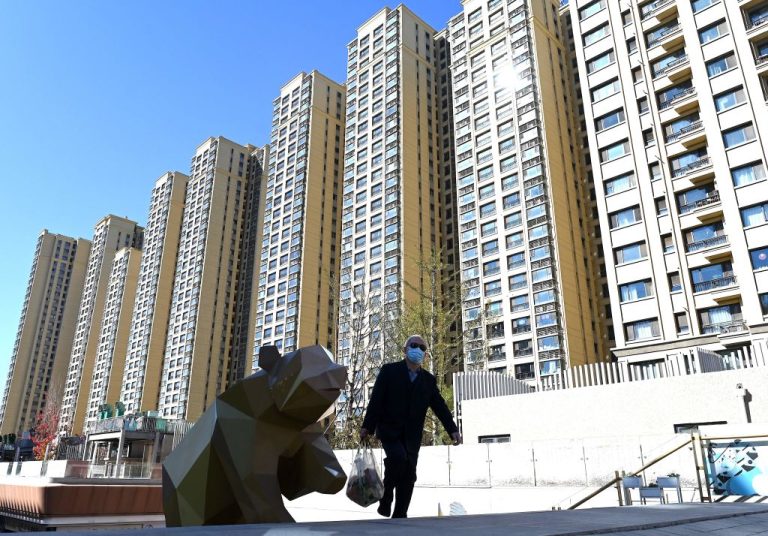On July 17, Evergrande, one of China’s largest real estate developers, revealed in its long-awaited financial reporting that the company lost upwards of $113 billion over 2021 and 2022 and has liabilities of nearly $340 billion.
In a stock exchange filing the company said the loss showed, “the existence of material uncertainties that may cast significant doubt on the Group’s ability to continue as a going concern.”
Evergrande suffered a net loss of 686.22 billion yuan or US$94.9 in 2021, and 125.81 billion yuan in 2022, or US$17.4 billion, bringing the total loss to just over US$112 billion.
In 2021, when it was discovered that the real estate juggernaut was drowning in hundreds of billions in debt, it sparked a nationwide property crisis that reverberated across the globe.
The company’s stock on the Hong Kong Stock Exchange, has been suspended since March 2022.
Success
You are now signed up for our newsletter
Success
Check your email to complete sign up
At the time the company said that it was unable to publish its 2021 audited financial results due to “a large number of additional audit procedures” in addition to the COVID-19 pandemic.
A year prior, in 2021, the company said it had total liabilities of upwards of 1.97 trillion yuan or US$272 billion by today’s exchange rate.
Unaudited 2022 financial statements indicate that these liabilities have ballooned to over 2.44 trillion yuan, or US$337.64 billion.
The soaring liabilities indicate that efforts to stop the bleeding, like selling off a number of subsidiaries, have failed.
READ MORE ON CHINA’S ECONOMY:
- Risk of Deflation in China Raises Concerns for the Global Economy
- China Shifts Focus to Domestic Demand and Green Tech Opportunities Amid Export Downturn
- Why China’s Youth Unemployment Rate May Be Much Worse Than 20%
Evergrande restructuring
Earlier this year, the company tabled a long-awaited restructuring proposal, “offering creditors a choice to swap their debt into new notes issued by the company and equities in two subsidiaries, Evergrande Property Services Group and Evergrande New Energy Vehicle Group,” Barron’s reported.
On Monday the company said, “The respective restructuring effective date is anticipated to be 1 October 2023 and the longstop date is 15 December 2023.”
China’s real estate industry has been plagued by crisis after crisis with major developers failing to complete housing projects, known as “rotten-tail” projects on the mainland, triggering protests and mortgage boycotts by disgruntled homebuyers.
In 2022, the Chinese Communist Party (CCP) stepped in and instructed banks to help struggling property developers fund the completion of housing projects amid a widening boycott by homebuyers who refused to continue paying mortgages on properties that had not been delivered as promised.
At the time, the China Banking and Insurance Regulatory Commission (CBIRC) told China Banking and Insurance News, a state-affiliated media organization, that “all difficulties and problems will be properly solved,” however problems persist to this day and many homebuyers in China are stuck paying mortgages on uncompleted, uninhabitable properties.
READ MORE:
- Yellen’s China Visit Fails to ‘Stabilize Relationship’
- Global Production Lags Due to Self-imposed Restrictions
- Youth Revolt Against China’s Crackdown on E-Bikes, Switch to Unregulated Electric Wheelchairs
China’s property market shrinking
It appears China’s real estate bubble has burst. Sales of Chinese property fell 28.1 percent in June compared to a year ago, much deeper than May’s 19.7 percent decline.
In the first half of 2023, property investment fell by 7.9 percent and new construction starts, by floor area, dropped 24.3 percent year-on-year while developer fundraising fell 9.8 percent.
The real estate sector accounts for a fifth of China’s Gross Domestic Product (GDP) and the crisis in the sector is being blamed for dragging down the country’s second quarter growth rate which, according to communist authorities, rose 6.3 percent from a year ago, well below the forecasted 7.1 percent.
Even these numbers are questionable as the CCP habitually manipulates official reporting in order to make things look more favorable than they actually are.
China’s economy is sputtering as consumer confidence plummets, exports hit a three year low, and the youth unemployment rate soars past 20 percent.
On July 19, in an effort to prop up its beleaguered economy, China’s central committee and state council published a joint statement pledging to improve conditions for private businesses by treating private companies the same as state-owned enterprises.
According to the statement, the regime intends to boost support for private companies in share listings, bond sales and overseas expansion.
The change in tone stands in contrast to the communist authorities previous approach of cracking down on major industries, such as the education and big tech industries.
However, Xin Sun, a senior lecturer in Chinese and East Asian Business at King’s College London, told Bloomberg, “I don’t see the harsh political and business environment recently experienced by the private sector to change overnight by a few guidelines.”
Gabriel Wildau, managing director at advisory firm Teneo Holdings LLC in New York, told Bloomberg, “It won’t turn sentiment around overnight, but private entrepreneurs do take these signals seriously, so this and similar statements from top leaders make a difference,” adding that, “A similar statement directly from Xi would have an even greater impact.”














